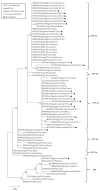Molecular Characteristics of Carnivore protoparvovirus 1 with High Sequence Similarity between Wild and Domestic Carnivores in Taiwan
- PMID: 34072499
- PMCID: PMC8229444
- DOI: 10.3390/pathogens10060671
Molecular Characteristics of Carnivore protoparvovirus 1 with High Sequence Similarity between Wild and Domestic Carnivores in Taiwan
Abstract
Carnivore protoparvovirus 1 (CPPV-1) is a DNA virus causing gastrointestinal disease and immunosuppression in various terrestrial carnivores. Domestic dogs and cats are considered the primary CPPV-1 reservoirs. The habitat overlap of wild carnivores and free-roaming dogs increases the threat of CPPV-1 transmission between them. This study explored the CPPV-1 distribution among wild carnivores in Taiwan through PCR screening and compared the partial capsid protein (VP2) gene sequences from wild and domestic carnivores. In total, 181 samples were collected from 32 masked palm civets (Paguma larvata), 63 Chinese ferret badgers (Melogale moschata), and 86 crab-eating mongooses (Herpestes urva), from 2015 to 2019 were screened for CPPV-1. The average prevalence of CPPV-1 was 17.7% (32/181), with the highest prevalence in masked palm civets (37.5%). In addition, a masked palm civet was coinfected with two CPPV-1 strains. Among the 33 partial VP2 gene sequences, 23 were identical to the sequences amplified from domestic dogs and cats in Asia, and the remaining 10 were identified for the first time. This study supported the circulation of CPPV-1 strains with the same genomic features as domestic carnivores that are also in wild carnivores from the same environment in Taiwan by molecular data. Therefore, further population control and health management of free-roaming domestic carnivores are recommended.
Keywords: Carnivore protoparvovirus 1; Taiwan; domestic carnivore; virus transmission; wild carnivores.
Conflict of interest statement
The authors declare no conflict of interest.
Figures



References
-
- Daniels T.J., Bekoff M. Population and social biology of free-ranging dogs, Canis familiaris. J. Mammal. 1989;70:754–762. doi: 10.2307/1381709. - DOI
-
- Turner D.C., Bateson P., Bateson P.P.G. The Domestic Cat: The Biology of Its Behaviour. Cambridge University Press; Cambridge, UK: 2000.
Grants and funding
LinkOut - more resources
Full Text Sources
Miscellaneous

